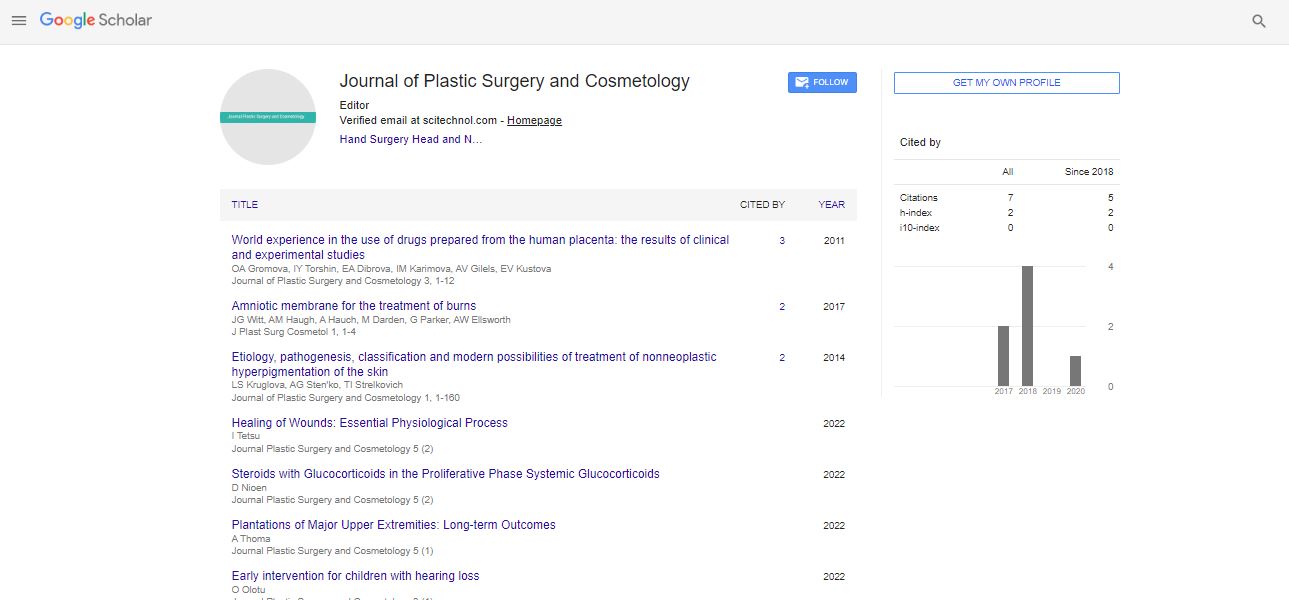Opinion Article, J Pls Sur Cos Vol: 12 Issue: 2
The Evolution of Plastic Surgery: Advancements and Impact on Society
Timothy Cathy*
Department of Plastic Surgery, University of Helsinki, Helsinki, Finland
*Corresponding Author: Timothy Cathy,
Department of Plastic Surgery, University of Helsinki, Helsinki, Finland;
E-mail: Cathymothy44@hotmail.com
Received date: 29 May, 2023, Manuscript No. JPSC-23-106755;
Editor assigned date: 31 May, 2023, PreQC No. JPSC-23-106755(PQ);
Reviewed date: 14 June, 2023, QCNo JPSC-23-106755;
Revised date: 21 June, 2023, Manuscript No. JPSC-23-106755(R);
Published date: 30 June, 2023, DOI: 10.4172/JPSC.100046
Citation: Cathy T (2023) The Evolution of Plastic Surgery: Advancements and Impact on Society. J Pls Sur Cos 12:2.
Description
Plastic surgery has undergone significant advancements over the years, transforming it into a highly sophisticated field that encompasses both reconstructive and aesthetic procedures. This study explores the evolution of plastic surgery, highlighting the advancements in techniques, technologies, and patient safety. Furthermore, it examines the impact of plastic surgery on individuals, society, and psychological well-being. Understanding the progression of plastic surgery can shed light on its current state and its potential for future developments.
Plastic surgery has a rich history dating back to ancient civilizations. Over time, it has evolved into a specialized medical discipline focused on enhancing physical appearance and restoring function. This study delves into the various facets of plastic surgery, from its historical roots to its present-day prominence.
Advancements in techniques and technologies
Reconstructive procedures: Advancements in reconstructive techniques have revolutionized the treatment of congenital anomalies, trauma-related injuries, and cancer reconstruction. Microsurgery, tissue engineering, and advanced imaging techniques have significantly improved outcomes and patient satisfaction.
Aesthetic procedures: The field of aesthetic plastic surgery has seen remarkable advancements, with refinements in facial rejuvenation, breast augmentation, body contouring, and minimally invasive procedures. The advent of innovative technologies, such as laser therapy, injectables, and non-surgical treatments, has expanded the possibilities for individuals seeking cosmetic enhancements.
Safety measures and patient care
Surgical techniques and anesthesia: Improved surgical techniques, including endoscopic procedures and minimally invasive approaches, have led to reduced scarring, faster recovery, and enhanced patient comfort. The development of safer anesthesia protocols and monitoring systems has further contributed to patient safety.
Patient education and informed consent: Emphasis on patient education and informed consent has become integral to plastic surgery practice. This includes ensuring patients have realistic expectations, understanding the potential risks and benefits, and providing comprehensive postoperative care instructions.
Impact on individuals and society
Psychological well-being and self-esteem: Plastic surgery can have a profound impact on an individual's psychological well-being and self-esteem. Enhancements to physical appearance can boost selfconfidence, improve body image, and positively influence overall quality of life.
Cultural and societal factors: Plastic surgery is influenced by cultural norms, media representation, and societal perceptions of beauty. The rise of social media and celebrity culture has contributed to an increased desire for cosmetic enhancements. However, it is crucial to promote a balanced perspective on beauty and emphasize the importance of self-acceptance.
Ethical considerations and future directions
Ethical concerns: Plastic surgery raises ethical questions regarding patient autonomy, societal pressures, and the potential for overemphasis on physical appearance. Ethical guidelines and responsible practices are necessary to ensure patient safety and ethical conduct within the field.
Future developments: Advancements in regenerative medicine, 3D printing, and personalized medicine hold hope for the future of plastic surgery. These technologies may revolutionize tissue reconstruction, scar treatment, and aesthetic interventions, providing safer and more effective solutions for patients.
Conclusion
Plastic surgery has come a long way, advancing both reconstructive and aesthetic procedures. The evolving techniques, technologies, and safety measures have transformed the field and influenced societal perceptions of beauty. However, it is imperative to prioritize patient safety, psychological well-being, and ethical considerations to ensure the responsible practice of plastic surgery. By embracing innovation while maintaining a holistic approach, the field of plastic surgery can continue to evolve, benefiting individuals and society as a whole.
 Spanish
Spanish  Chinese
Chinese  Russian
Russian  German
German  French
French  Japanese
Japanese  Portuguese
Portuguese  Hindi
Hindi 